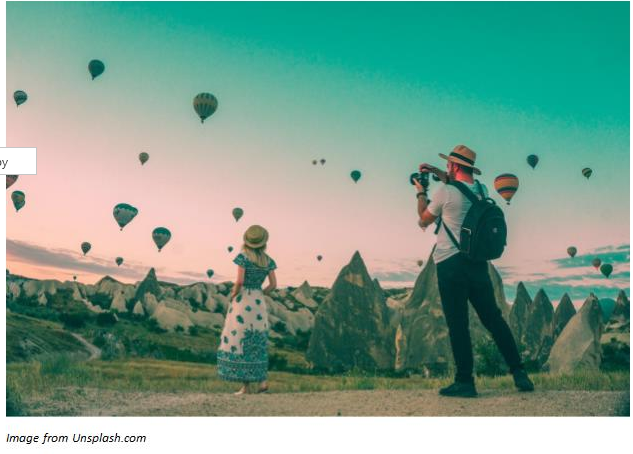“What does Travelling mean to you?”. This is a question that many have frequently asked, and they have all given different answers. For some, traveling can be seen as a way for them to have new experiences, see new places, people, and experience new cultures along the way.
For some people, traveling is a stress-relief purpose, sometimes done to get out of the same routine that includes plying the same roads, seeing the same people, and the same things. This is true of many people in frustrating jobs.
For others, traveling serves as a bonding experience between friends and family members, gaining new experiences to share with others and remember in their old age. As a result, many make it a point of duty/tradition to travel annually, bi-annually, or quarterly.
Yearly, millions of people take trips, resulting in generated income for countries with many famous natural and artificial attractions. The Travel and Tourism industry is one of the largest in the world today, and the statistics show that. In 2018, it was reported that travel and tourism generated as high as $29 trillion globally.
Come 2020, COVID-19 struck, resulting in nationwide curfews in countries with high cases of infected persons. The impact of the coronavirus pandemic was immense, hitting many sectors of world economies. Many institutions had to close down temporarily, as a result hindering tourist activities.
It has taken some time, but the world has found ways to effectively combat the COVID-19 and its health effects through a series of treatments and developed the vaccine to prevent others from getting infected.
The implication of the progress made means that the curfews have been lifted in many places. People are now allowed to move around with a degree of freedom, provided they do so within the laid down guidelines for health and safety protocols.
People are now allowed to travel interstate and internationally, which for many would translate to the resumption of physical tourist activities. Figures on international tourism data show that tourist centers typically receive thousands of people daily looking for a tour to learn about the landmark. This type of gathering is considered unsafe in the world presently.
As such, anyone taking a trip for a tour is ill-advised until large social gatherings are deemed safe by health officials. Instead, there are alternative methods of touring the world and seeing sights provided by the advent of technology.
Besides the virus, the technology put into virtual methods of touring also allows germophobes, agoraphobic people, and persons low on travel funds to take tours to places they cannot visit physically. Before the re-approval of traveling activities by health agencies, the following are some ways by which you can get the best tourist experience comfortably.
Best Ways to Explore the World Now-Virtual Travel

Virtual Tours
Virtual Tours are pretty dissimilar from Virtual Cruises, in which the location is the primary source of excitement. A virtual tour offers extensive insight into a particular landmark – natural or artificial. The narrator teaches the viewer the history of the location, including when it was established initially and the management’s changes over time.
To fully demonstrate the experience, virtual tours are done in the same way as physical tours. The viewer is provided with an accurate map of the place, and they are taken through the entirety of the area as the narrator talks about each stop and its significance to the landmark. The more popular landmarks with fantastic views all have the virtual tour experience incorporated into their activities to allow people from far and near to partake in the experience. The virtual tour feature has also spread to many museums now, and virtual museum tours operate in the same format as other landmarks.
Virtual tours are on a website run by the landmark’s management team, and anybody can take them at any time after due payment.
Travel Programs-Virtual Travel
While virtual tours and cruises are restricted to one place/experience, Travel Programs are not. Travel programs in their essence cover the adventures of a person or a group of people through a series of places, featuring many landscapes, seascapes, and other building attractions.
A travel program helps people who live their lives on the road or those whose careers deal with traveling and exploring new places connect with what they love. It is one of the best ways to explore the world virtually, and it is non-dependent on a particular travel service, gathering information from thousands.
Given the popularity, cable TV services and popular streaming services like Netflix broadcast them on stations and platforms, respectively. Users with active subscriptions to streaming platforms have the convenience of selecting a travel program at any time and watching it to relax.
However, a minor hindrance is that many do not have broadcasting rights in countries outside their own, causing users outside those regions to lack access. Users that find themselves confronted with this difficulty can try streaming Netflix with a VPN that can transmit their location as the desired one, thereby bypassing the viewing restrictions.
Virtual Cruises
Much like the name suggests, a Virtual Cruise is an experience where the viewers are taken on a journey of a previously filmed cruise of someone; typically, in a yacht, car, or boat. While it does not garner as much attention as other forms of virtual experiences, virtual cruises have proven to be highly effective. It allows the viewer to enjoy landscapes and seascapes as they used to do previously.
A select few websites host virtual cruises, it is shown from the perspective of a camera on board, and anyone can join in on them for a price comparatively lower than the costs of booking a physical cruise.
The target audience of virtual cruises is those who consider the journey more important than the destination as they get to see and experience new things along the way that are considered more exciting than a particular location.
Conclusion
For now, it is too soon to determine the overall effects that the COVID-19 pandemic has/will have on world economies, but it is conclusive that it will take a while for countries to recover from the havoc wreaked.
Regarding the travel and tourism industry, statistics experts predict that the tourism numbers the world was getting in 2019 cannot be re-actualized until 2023 when the traces of the coronavirus should be almost worn out.
In the spirit of things getting better, “about 40% of people are looking to take trips as the COVID-19 is almost out of the society”, the survey conducted in several states claim. However, we are quite away from those days, hence the need for alternative methods of exploring the world for everyone.
Frankly, the observation of governments of the potential of travel & tourism and the willingness to invest in technological tourism methods have proven to be quite resourceful. Aside from being a steady income-generator for the economy, many may not have survived the pandemic period without them.
It’s been noted that many people tuned in to travel programs, went on virtual tours and cruises to remind themselves of the beauty of the world outside their homes. An action that may have helped preserve the mental health status of those affected people.
Recommended Reads
- 10 Best Car Accessories to Improve Your Road Trip
- 5 Best Reasons Why Travel is Important
- 20 Best Songs about the Beach
- Can an Airbnb Have Cameras?-The Answer May Surprise You
**virtual travel-key



